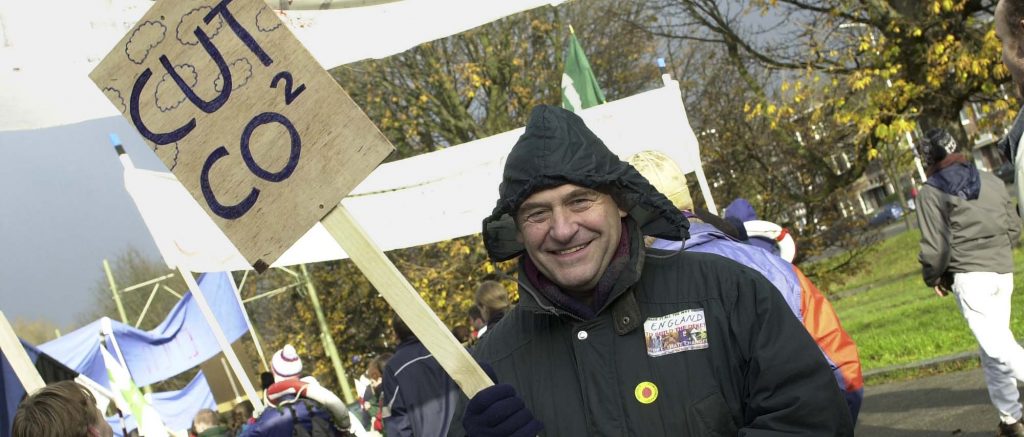Strasbourg, November 13 – Friends of the Earth Europe has urged MEPs to support proposals to strengthen EU plans to cut aviation’s climate impacts in a crucial vote in Strasbourg today (Tuesday 13 November) [1].
The EU Parliament will vote on amendments to the European Commission’s plan to bring aviation emissions into the EU Emissions Trading Scheme (EU ETS) [2]. Friends of the Earth Europe and other NGOs are calling on the European Parliament to strengthen the proposals by voting for:
-
An emissions cap of 50 percent of an average of 2004-2006 levels in line with other industry sectors;
-
All emissions permits to be sold to airlines at auction rather than given out for free;
A multiplier of at least two, to be used to compensate for the additional impacts of emissions from aircraft at altitude; -
Strict limits on the number of emissions permits airlines can buy from projects in developing countries in order to incentivise emissions cuts within the EU.
Earlier this year a report by the Tyndall Centre for Climate Change at Manchester University, commissioned by Friends of the Earth [3], revealed that current EU proposals would make little difference to the future growth in aviation emissions, and that the plans should be considerably strengthened. Friends of the Earth insists that other measures are also required to tackle the growth in aviation’s impact on climate change, such as a tax on aviation fuel [4].
Friends of the Earth Europe’s aviation campaigner, Richard Dyer, said:
“Aviation is the fastest growing source of carbon dioxide emissions in Europe. This vote is a crucial test of the European Parliament’s commitment to tackling climate change. Earlier this year EU Ministers agreed that Europe needs to cut its emissions by 30 percent by 2020. This vote is the first chance for MEPs to show that Europe means business. Failure to considerably strengthen proposals to bring aviation into the European Commission’s Emissions Trading Scheme will make the targets look like hot air.”
“National governments must also take action. They should be freezing airport expansion plans, improve high-speed rail services and do more to make the cost of flying reflect the damage that it causes to our environment.”
The current aviation/EU ETS plan is the first piece of new climate legislation since EU Ministers agreed that the EU needs to cut its carbon dioxide emissions by 30 percent by 2020 in order to avoid catastrophic climate change [5]. A strong scheme would send a clear signal that the EU means business in the run up to the UNFCCC talks taking place in Bali this December [6].
***
NOTES TO EDITORS
1. MEPs are expected to vote on amendments to the Commission’s proposal in the early afternoon on Tuesday 13. They will consider amendments proposed in the Environment Committee’s report (the Liese report) and others put down since.
The European Parliament’s Environment Committee voted in September 2007 to substantially strengthen the Commission’s proposal (the Liese report), however this was still much weaker than earlier proposals (the Lucas Report) that Parliament voted for in July 2006: Liese report
Lucas report:
http://www.europarl.europa.eu/sides/getDoc.do?pubRef=-//EP//TEXT+TA+P6-TA-2006-0296+0+DOC+XML+V0//EN
After the MEPs vote the proposal goes to the EU Council of Environment Ministers meeting in December. In 2008, Parliament and Council consider the legislation again (2nd reading).
2. The EU ETS was launched in 2005 and covers around 45 per cent of EU carbon dioxide emissions. Under the scheme, power stations, refineries and heavy industry across Europe are given a limit to how much carbon dioxide they can emit. Participants in the scheme must hold sufficient carbon dioxide permits to match their levels of pollution. Companies that exceed their permits must buy extra allowances from those companies who have managed to reduce their emissions – or pay stiff fines. The EU Emissions Trading Scheme is currently under review. A joint position statement on what improvements environmental groups including Friends of the Earth want to see in the review is here:- http://www.foe.co.uk/resource/consultation_responses/eu_ets_review.pdf
3. http://www.foe.co.uk/resource/press_releases/scientists_warn_that_eu_pl_03092007.html
4. A position statement on the key improvements to the aviation ETS proposal that a coalition of environmental groups including Friends of the Earth want to see is available at:- http://www.foe.co.uk/resource/briefings/aviation_in_the_euets.pdf
5. In March 2007, EU Ministers agreed a 2020 target to unilaterally reduce greenhouse gas emissions by 20 percent from 1990 levels; agreed that a 30 percent cut by industrialized countries is needed to avoid catastrophic climate change; and committed to reducing emissions by 30 percent if other developed countries do the same and if economically more advanced developing countries contribute adequately according to their respective responsibilities and capacities.
see: Brussels European Council, 8/9 March 2007. Presidency Conclusions.
http://www.consilium.europa.eu/ueDocs/cms_Data/docs/pressData/en/ec/93135.pdf
6. The December United Nations Framework Convention on Climate Change (UNFCCC) Bali conference, will focus on reaching international agreement on concrete steps to be taken in view of a framework to follow the end of the Kyoto Protocol’s first commitment period in 2012.






